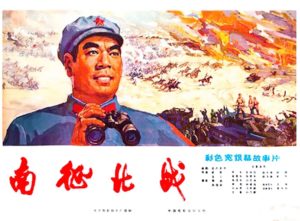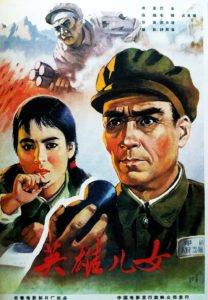One Second
一秒钟
China/Hong Kong, 2020, colour, 2.35:1, 104 mins.
Director: Zhang Yimou 张艺谋.
Rating: 8/10.
Zhang Yimou bounces back artistically with a likeable morality tale set during the Cultural Revolution that doubles as a love letter to the power of celluloid.
A small town on the edge of a desert, somewhere in northwest China, c. 1975. A scruffy looking man (Zhang Yi) emerges from the desert into a small town. That night he sees a ragamuffin (Liu Haocun) steal a can of film from the unattended motorbike of Yang He (Li Yan), the idiot son of a collective-farm supervisor who transports film prints between cinemas. The man pursues the ragamuffin, retrieves the film can, but then finds the motorbike gone. He sees it’s Reel 6 of the feature film Heroic Sons and Daughters 英雄儿女 [1964]. The ragamuffin then pulls a knife, forcing him to knock the person out. Only later does the man realise the ragamuffin is a girl, who suggests splitting any gains from the reel of film inside the can. He refuses; she then knocks him out and escapes with the film can. Next day, almost dead from thirst, the man is picked up on the edge of the desert by a passing lorry driver (Yu Yang). The man claims he’s from the Second Unit and is looking for his runaway daughter. When the lorry driver later stops to pick up the girl too, the man retrieves the can and the girl plays along with his story that she’s his daughter, adding various salacious additions of her own. Spotting Yang He on his motorbike, the man gets out and tries to flag him down; but Yang He doesn’t stop and the lorry drives on with the girl and the film can. The man finally reaches a small town, where Heroic Sons and Daughters is to show that evening at 20:00. The projectionist, Fan (Fan Wei), tells people that Yang He hasn’t arrived yet with the film. In a restaurant where Fan goes to, the man sees the girl; he takes the can from her and offers it to Fan, who starts questioning the pair. He recognises the girl as so-called Daughter Liu, an orphan from the local Second Unit; the man then claims he’s from the First Unit and the girl first backs him up by saying they found the film can on the road from the First Unit but then accuses him of being a “bad element”. When Fan threatens to call the towns’ Security Section, the man says he came to see the news documentary being screened before tonight’s film – News Documentary No. 22, in which his young daughter, a student, is visible. Suddenly, Fan’s son (Cao Rui) arrives outside with a cart of logs; on top are the cans of Heroic Sons and Daughters, but one reel has spilled out and been dragged along the ground. Fan is furious with his son, who says he was just helping Yang He, whose motorbike had broken down again. Fan threatens to cancel the evening’s programme but the man persuades him to try to clean the film and re-spool it. The reel in question is the news documentary he’s so desperate to see. Outside town, the man has a quiet talk with the girl, who says she comes from a broken home and has a younger brother (Zhang Shaobo) whom she’s encouraging to study. Both are bullied by local youths. She then asks the man why he’s so afraid of the town’s Security Section.
REVIEW
After his iffy flirtation with an international monster movie (The Great Wall 长城, 2016) and a stylised but weakly scripted costume tragedy (Shadow 影, 2018), Mainland director Zhang Yimou 张艺谋 bounces back artistically with One Second 一秒钟, a black comedy-cum-moral-tale-cum-celebration-of-friendship set during the tail end and immediate aftermath of the Cultural Revolution (1966-76). Originally to have premiered at the Berlin festival in Feb 2019, it underwent reshoots later that year and was finally released – well clear of the politically sensitive year of 2019, the 70th anniversary of the PRC – in late Nov 2020. At almost RMB100 million in its first week, box office has been curious rather than explosive. Zhang’s two other CR-themed dramas weren’t major attractions either, and in box-office terms One Second looks like ending up between the two of them, Under the Hawthorn Tree 山楂树之恋 (2010; RMB145 million) and Coming Home 归来 (2014; RMB291 million). [In the event, it finally took only RMB131 million, slightly less than Hawthorn.]
Like Hawthorn and Coming Home, One Second isn’t so much about the Cultural Revolution as the emotional effects the period has on the story’s characters. In Hawthorn, set in 1970, the unfolding is almost on a purely metaphysical level, as two youngsters from politically dodgy families fall in love; in Coming Home, which opens in 1973, a daughter betrays her father who has escaped from a labour camp, which leads to a long spell of emotional repair after the CR ends. One Second, which opens in 1975, is close to Coming Home in some respects, as it involves a fugitive and multiple betrayals. Here, an outsider turns up in a town on the edge of a desert, and gets to know another outsider (a ragamuffin orphaned girl) as they become involved with a missing can of film and a news documentary that has a special meaning for the man. A love letter to the emotional power of cinema, it’s also, like many of Zhang’s films, a kind of love story, as two lost souls meet in extreme circumstances, argue and bond, and several years later appreciate the irony of what happened.
 Though no time or place is specified on screen, internal evidence places the story on the edge of a desert somewhere in northwest China during the summer. There’s talk of the film From Victory to Victory 南征北战 (first released in Oct 1974, see poster, left) still doing the rounds, and the coda, set “two years later”, makes explicit reference to the resumption of the university entrance exam, which happened in late 1977. The story, therefore, starts in the summer of 1975, about a year before the CR is officially to end, though of course none of the protagonists knows that. The main character (who’s never named but in cast lists is called Zhang Jiusheng 张九声, literally “Nine-Sounds Zhang”) emerges from the desert like a wraith, a man with no background, and it
Though no time or place is specified on screen, internal evidence places the story on the edge of a desert somewhere in northwest China during the summer. There’s talk of the film From Victory to Victory 南征北战 (first released in Oct 1974, see poster, left) still doing the rounds, and the coda, set “two years later”, makes explicit reference to the resumption of the university entrance exam, which happened in late 1977. The story, therefore, starts in the summer of 1975, about a year before the CR is officially to end, though of course none of the protagonists knows that. The main character (who’s never named but in cast lists is called Zhang Jiusheng 张九声, literally “Nine-Sounds Zhang”) emerges from the desert like a wraith, a man with no background, and it  is back into the desert that he disappears near the end. He’s soon involved by chance with another character without any background, a teenage orphan who exists by stealing to support herself and her younger brother. The first 20 minutes, as the stolen can of film (from the popular 1964 war horse Heroic Sons and Daughters 英雄儿女, see poster, left) passes from one to the other, are played like a black comedy-cum-desert road movie, with the man obviously lying about his past and the girl always trying to get the better of him. Like the main characters, most people in the film either have no name or a nickname.
is back into the desert that he disappears near the end. He’s soon involved by chance with another character without any background, a teenage orphan who exists by stealing to support herself and her younger brother. The first 20 minutes, as the stolen can of film (from the popular 1964 war horse Heroic Sons and Daughters 英雄儿女, see poster, left) passes from one to the other, are played like a black comedy-cum-desert road movie, with the man obviously lying about his past and the girl always trying to get the better of him. Like the main characters, most people in the film either have no name or a nickname.
The real story starts as they reach a small town where the man returns the missing can of film to the cinema’s projectionist, a born survivor who’s never made a mistake in his life and is known by the locals as Fan Dianying 范电影 (“Fan the Movie Man”). Grateful to the man but also suspicious, Fan enters into a relationship of convenience with him to restore another reel of film that has ended up damaged en route. This reel – News Documentary No. 22 – holds a special significance for the mysterious stranger.
From the dusty, 1970s art direction by Lin Chaoxiang 林潮翔 (Coming Home) to the versatile widescreen photography by Zhang’s regular d.p. Zhao Xiaoding 赵小丁 (all lens flares in the desert light, and projector beams in the makeshift cinema), the film screams period authenticity in its look and props – and has none of the sanitised decorativeness often found in other films set during the period. While nostalgically lauding the power of mass effort (as the whole town is mobilised to clean and repair the damaged documentary), the script by Zhang, veteran playwright Zou Jingzhi 邹静之 (Coming Home) and Zhou Xiaofeng 周晓枫 doesn’t shy away from the casual bullying and hooliganism that took place during the Cultural Revolution under the guise of political reform. Though the story – which, unlike Hawthorn and Coming Home, is not based on any novel – is very film-buffy in its focus, One Second is among the most accurate and atmospheric depictions of everyday provincial life during the Cultural Revolution.
On to it the writers have grafted an ironic morality tale in which a man’s obsession with a second or so of film is later shown to be just part of a general madness of the time, and that life and human relationships are what ultimately survive. So, while it is Zhang’s love letter to the power of celluloid, it’s also just a passing fairytale, an anecdote from a tumultuous time. If it’s a notch below Coming Home, that’s because it lacks that film’s sheer emotional power. One Second is ultimately a very manufactured story which doesn’t quite bring all its elements together at the end and is built on a central relationship that’s more cute than moving.
Though shot over two years ago, the film is another big step up for Zhang Yi 张译, a hangdog-faced actor who’s mainly been in character roles but has recently shown he can also carry a movie (The Sacrifice 金刚川, 2020). Eighteen at the time of shooting, newcomer Liu Haocun 刘浩存, a Changchun-born dance student, holds her own against the grizzled Zhang and especially opposite veteran comedian Fan Wei 范伟, whose sly portrait of the proud, bullying projectionist very much holds the whole film together as it slides effortlessly between irony and drama. Other roles are just bits, but well etched, especially Yu Yang 于洋 as a gullible lorry driver. Character actor Yu Ailei 余皑磊, usually cast as a shady criminal, pops up briefly as head of the town’s bumbling Security Section.
Since shooting One Second, Zhang hasn’t exactly been idle. He’s already shot the spy adventure Impasse 悬崖之上, set in 1930s Manchuria, with Zhang and Liu [released as Cliff Walkers in Apr 2021], and the crime drama Under the Light 坚如磐石, starring Lei Jiayin 雷佳音, Zhang Guoli 张国立 and Zhou Dongyu 周冬雨 [released in Sep 2023]. He also has the script of another film with Zhang Yi okayed for shooting (最冷的枪, literally “The Coldest Gun”). [This last project, which began shooting in Jan 2021, was released as Snipers 狙击手 in Feb 2022.]
For the record, the script of One Second was passed for shooting by China Film Administration 国家电影局 in Jun 2018 and shooting took place around Dunhuang, Gansu province, from 10 Jul to 6 Sep that same year. On 17 Jan 2019 it was announced the film would have its world premiere in the competition section of the 2019 Berlin film festival. That same month it was re-examined by CFA as an international co-production (with Hong Kong). On 11 Feb, four days before the first screening in Berlin, the festival announced the film was withdrawn “due to technical difficulties”; its slots were filled by screenings of Zhang’s martial-arts drama Hero 英雄 (2002). In Oct 2019 the crew returned to Dunhuang for re-shoots. A year later, the film was announced as the opening-night gala of the 2020 China Film Golden Rooster Awards festival (25-28 Nov) in Xiamen, Fujian province; however, one day before the screening it was withdrawn. The film opened publicly a couple of days later, on 27 Nov.
CREDITS
Presented by Huanxi Media Group (Beijing) (CN), Huanxi Media Group (HK), Huanxi Media Group (Shanghai) (CN), Tianjin Maoyan Weiying Cultural Media (CN), Edko Films (HK), Huanxi Media Group (Tianjin) (CN). Produced by Changxing Sanyi Shengshui Culture Media (CN).
Script: Zhang Yimou, Zou Jingzhi, Zhou Xiaofeng. Photography: Zhao Xiaoding. Editing: Du Yuan. Music: Lao Zai [Loudboy]. Art direction: Lin Chaoxiang. Sound: Tao Jing, Mi Haoyi.
Cast: Zhang Yi (the man/Zhang Jiusheng), Liu Haocun (Liu Guinv/Daughter Liu), Fan Wei (Fan Dianying/Mr. Movie), Yu Ailei (Cui, security section supervisor), Zhang Shaobo (Liu Didi/Little Brother Liu), Li Yan (Yang He), Yu Yang (lorry driver), Liu Yunlong (security section personnel), Tang Ziyue (boy bully), Cao Rui (Fan’s son).
Release: China, 27 Nov 2020; Hong Kong, tba.
